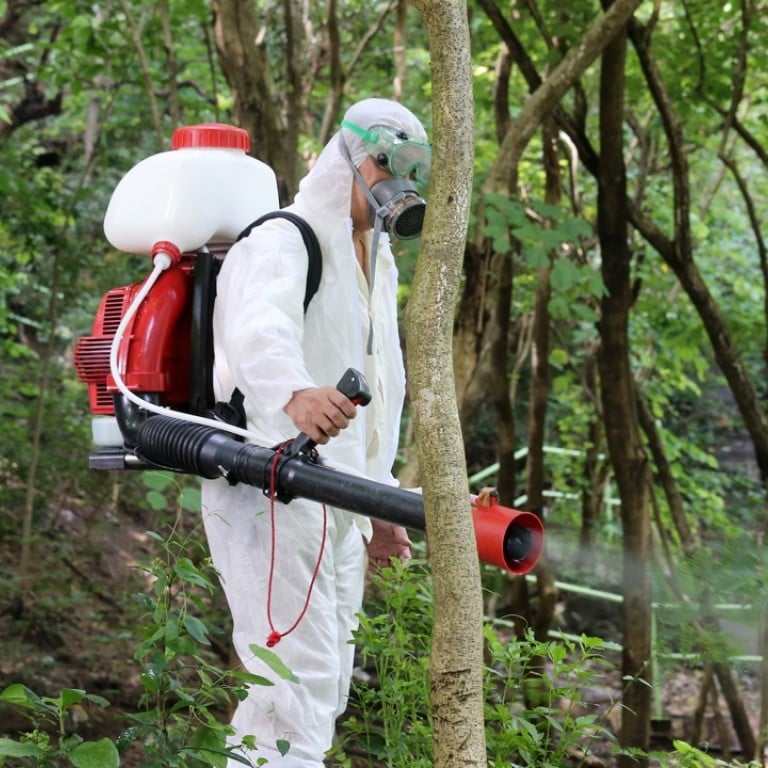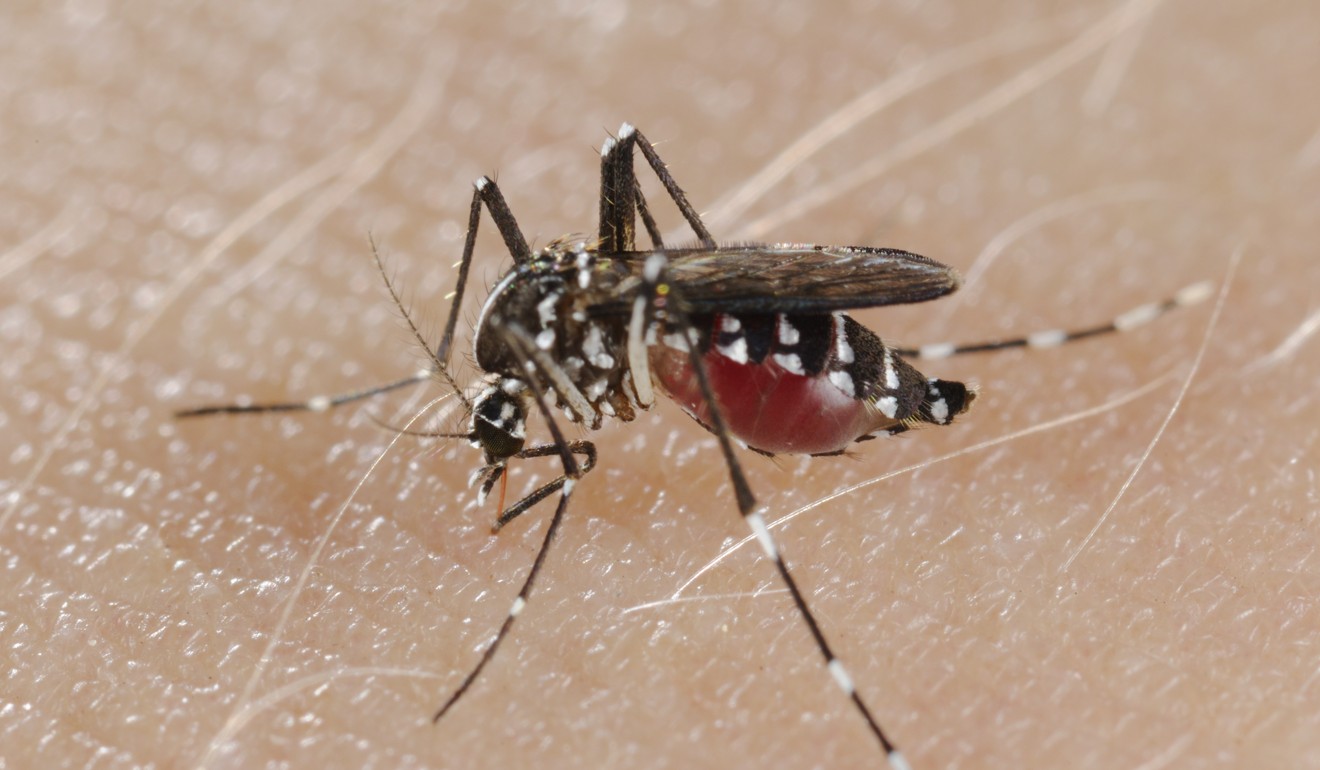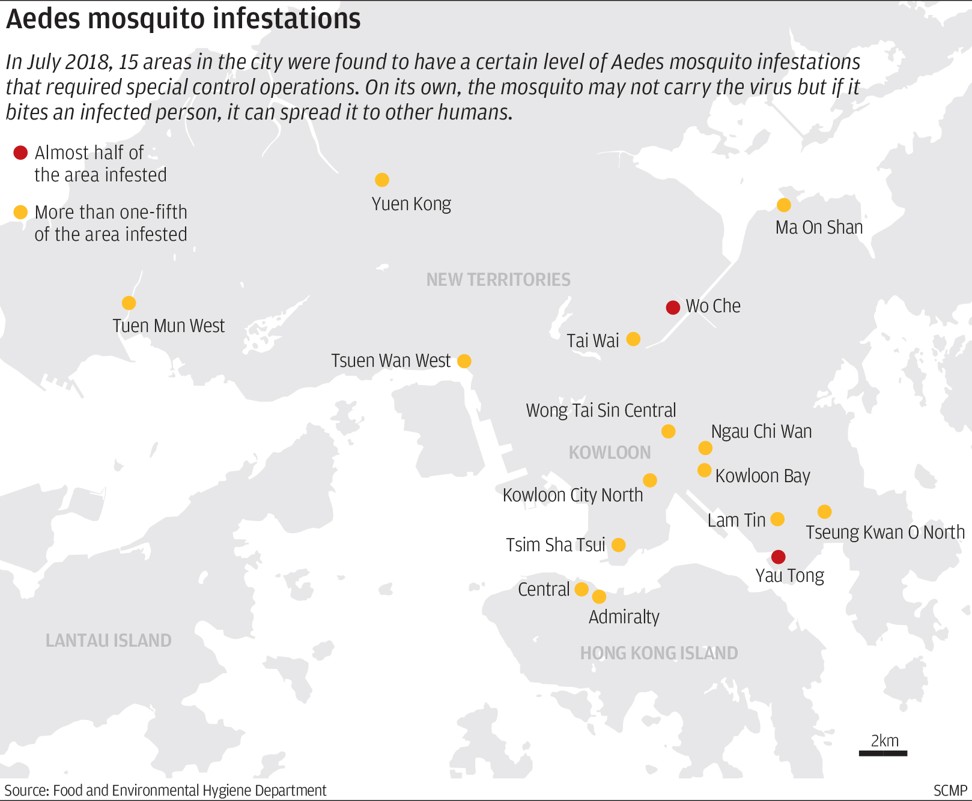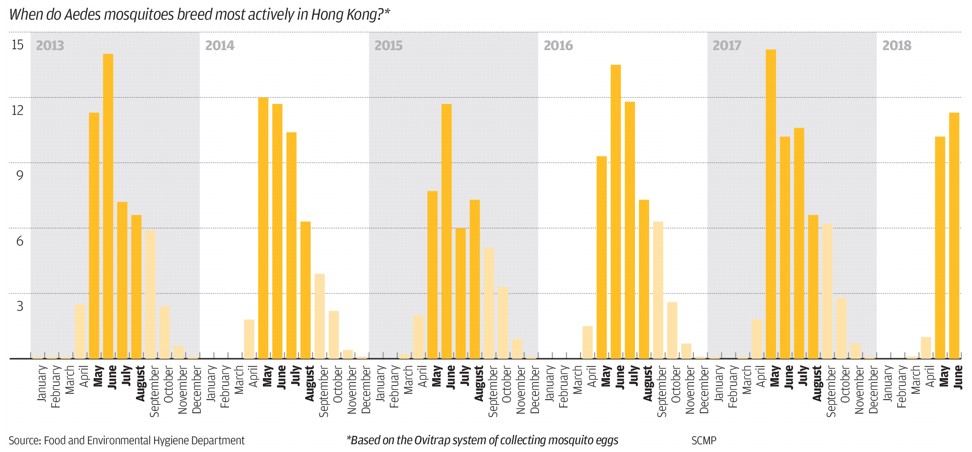
Health officials in Hong Kong take action to prevent outbreak of dengue fever as it warns city could see more infections
Centre for Health Protection puts real-time monitoring system in place so public hospitals can alert them to potential outbreak of mosquito-borne virus
From Thursday, public hospitals will use a real-time monitoring system to alert health authorities if they treat patients suspected of having dengue fever, so fast action can be taken in areas where an outbreak seems imminent.
Medical personnel will submit case details via an online platform called “e-Dengue” as they step up the fight against the mosquito-borne virus.
The Centre for Health Protection on Tuesday announced that four people had dengue fever, which they contracted locally. It was unusual to have this number of cases confirmed in a day, it said, and warned it could herald more infections.

On its own the insect does not carry the virus, but if it bites someone who has it, it can carry the virus to its next victim. Humans cannot pass the virus directly to others.
The four cases were of a 17-year-old boy from Highland Park residential estate in Lai King, a 78-year-old man from Kwai Shing West Estate in Kwai Chung, an 84-year-old woman from Hillside Road in the outlying island of Cheung Chau, and a 76-year-old woman from Tsui Chuk Garden in Wong Tai Sin.
Hygiene officers fogged these areas and other places patients had visited with insecticide on Wednesday, while health officials stepped up mosquito control measures at hospitals and told schools to do the same.
Three of the four patients had not left the city recently. The 76-year-old woman visited Okinawa in Japan last week, but officials believe she was also infected locally. All of them are in stable condition.
On Wednesday, the centre said the 17-year-old boy had visited a baseball field at Lion Rock Park. The 76-year-old woman had also gone to the park.
“Further laboratory investigation revealed that except for the 84-year-old female patient living in Cheung Chau, the genetic sequences of the virus from the other three cases are identical,” it said, without elaborating.

University of Hong Kong microbiologist Dr Ho Pak-leung said on Thursday that such findings meant there were two different sources of the virus. But he said it did not mean people carrying a virus with the same genetic sequences were infected in the same place.
“If it’s the same origin but they don’t have the same points of exposure, then the explanation is that there might already be secondary transmissions,” he said on a radio programme.
He explained that secondary transmission meant a person might have been infected outside Hong Kong, returned to the city and got bitten by a mosquito, which then bit another person and transmitted the virus.
According to a local study by researchers from Chinese University and Queen Elizabeth Hospital, an estimated 4.6 per cent of the city’s population carried antibodies against dengue, and the figure rose to 32.7 per cent for those aged 65 years or older. The figures were based on tests on 2,100 serum samples collected from patients admitted to Prince of Wales Hospital in Sha Tin from 2013 to 2015.
A spokesman for the Leisure and Cultural Services Department said the Sai Tso Wan Recreation Ground, where the 17-year-old patient had been, received 10 mosquito eradication treatments in the past three months.
In the next 30 days the department will impose more frequent fogging – once every two days – on three of the venues involved in the four infection cases. Besides the recreation ground, the other two venues are the Clear Water Bay Second Beach and Lion Rock Park.
Pest controllers like Gary Yam Wing-keung, who has been in the business for 30 years, confirmed there were more mosquitoes this year compared with previous year.
Dengue fever is not endemic to Hong Kong, but as the city is in a sub-tropical zone the Aedes albopictus mosquito is found here and is active in the summer.
“The hot season arrived earlier this year and with higher temperatures,” Yam said, adding that his workers also saw more rats and termites.
His company has been contracted to conduct pest control at 40 to 50 sites across the city, including parks, public housing estates and private residential complexes.
Another pest controller Henry Cheng Kowk-hang said his company handled 10 to 20 requests for fogging each month, and this was 20 to 30 per cent more than last year.
Yam suggested managers of public facilities and private premises step up efforts to stop the insects from breeding, especially if the hot weather lasted longer with typhoons happening more frequently.
“The Aedes albopictus mosquitoes are mainly bred in water collecting in various abandoned containers, ranging from planters to used tyres,” Yam said.
Infectious diseases expert Professor Ivan Hung Fan-ngai said the four cases could be “just a cluster of local cases in the summer”.
Still, Hung, from the University of Hong Kong, warned that “with global warming, the risk of dengue becoming endemic is always there”.
The Aedes albopictus breeds in stagnant water found around homes and buildings and once it passes the virus to someone, the person can develop dengue fever within three to 14 days.
More dengue infections possible, health officials warn, as Hong Kong confirms four local cases in one day
Those infected are likely to display symptoms such as high fever, severe headache and muscle pain. While there is no cure for dengue, there is a vaccine used in Singapore.
Treatment for the viral infection includes managing the fever and ensuring the patient has enough fluids. People usually do not die from dengue fever, but the risks are higher for older patients.
Hung urged residents to do their bit to eliminate breeding spots.
“Empty water buckets, bottles and tyres in the environment, [and] set mosquitoes traps and use bio-insecticides,” he said.




